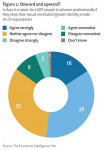Private sector involvement in education a positive trend,according to Economist Intelligence Unit
As a result, 92% of all respondents say it is important for the private sector to advocate in favour of improvements in academic performance to policy-makers. The private sector has not missed this point. The question is not if, but rather how, corporations become engaged in education. These are the key findings of an Economist Intelligence Unit report, also sponsored by Cisco—Global education 20/20: What role for the private sector?
The research also shows that the private sector is aiming to balance direct engagement against policy interaction depending on educational level. “Better education is in everyone’s interest,” says Kim Andreasson, senior editor, Industry & Management Research at the Economist Intelligence Unit and author of the report. “And the private sector can play an important role in education even though it is unlikely to replace the role of the state.”
The main findings of the report include:
· Corporations can make a difference. When asked if the private sector can affect education policy in their country, 94% of all respondents say it can affect policy either to a great extent (41%) or to some extent (53%). Among those who said the private sector can influence policy to a great extent, 96% also said is was somewhat or very important for the private sector to advocate for increased levels of academic performance to policy-makers.
· Engagement is pragmatic. For a corporation, it is easier to become involved at the university level where there is a natural link to the private sector through internships, employment opportunities and fundraising. For lower educational levels the gap is wider and the influence not felt as much. Only 8% of all respondents say that corporations are somewhat or very involved in the development of primary education curricula; for secondary education the equivalent number is 9%. However, that number rises greatly at higher education levels. Twenty-five percent of all respondents say the private sector is somewhat or very involved in curriculum development at the college level, and almost half (48%) say the same about graduate school.
· But will the commitment last? When asked about the most important global educational trend over the next decade, only 14% of all respondents predict it will be a growth in private sector involvement. With the current economic turmoil, most corporations are focused on survival. One-fifth (21%) of survey respondents say the involvement of the private sector in education increases in an economic downturn while almost half (46%) say it decreases. About a quarter (27%) says it neither increases; nor decreases.
Global education 20/20: What role for the private sector? is available free of charge at www.eiu.com/sponsor/cisco/globaleducation2020/
Notes for editors
Global education 20/20: What role for the private sector? is an Economist Intelligence Unit report sponsored by Cisco. In order to assess attitudes about the role played by the private sector and how it affects traditional education, the Economist Intelligence Unit conducted an online survey of 211 private sector executives and educational respondents in February 2009. Of the 123 private sector respondents in the survey, 39% describe themselves as board members or C-level executives. Forty percent work for publicly listed corporations and 52% for privately owned companies. One-half (50%) work for companies with global annual revenue exceeding US$500m. Of the 88 respondents from educational institutions in the survey, 62% represented an institution that offered graduate education, and 45% a college education. Another 28% represented corporate education, and 18% and 14% offered secondary and primary education, respectively. Forty-one percent of the institutions were state owned, 40% were privately owned and 5% were publicly listed. A majority (62%) of respondents came from organisations with annual operating budgets of US$250m or less.
About the Economist Intelligence Unit
The Economist Intelligence Unit is the world leader in global business intelligence. It is the business–to–business arm of The Economist Group, which publishes The Economist newspaper. As the world's leading provider of country intelligence, the Economist Intelligence Unit helps executives make better business decisions by providing timely, reliable and impartial analysis on worldwide market trends and business strategies. More information about the Economist Intelligence Unit can be found at www.eiu.com.
웹사이트: http://www.eiu.com
연락처
Joanne McKenna
Press Liaison
Economist Intelligence Unit
26 Red Lion Square
London
WC1R 4HQ
UK
Direct: +44 (0) 20 7576 8188
Sales: +44 (0) 20 7576 8181
Switchboard: +44 (0) 20 7576 8000
email: 이메일 보내기
이 보도자료는 Economist Intelligence Unit가(이) 작성해 뉴스와이어 서비스를 통해 배포한 뉴스입니다. 뉴스와이어는 편집 가이드라인을 준수합니다.




